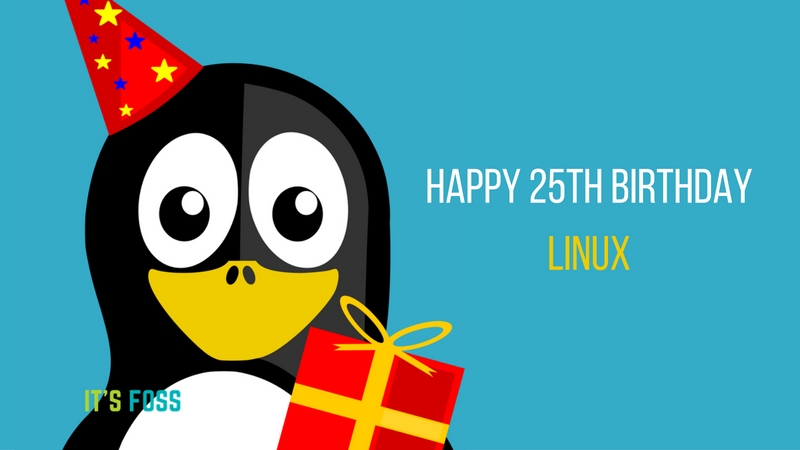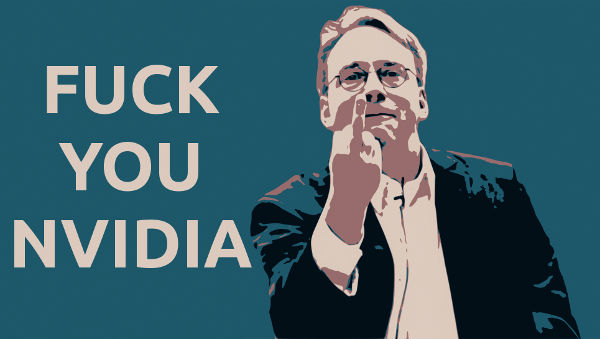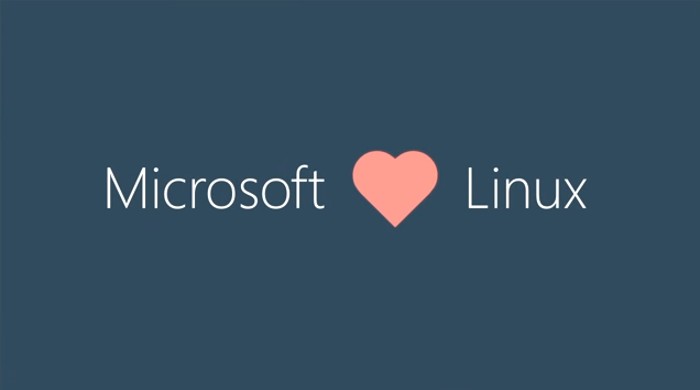Linux is 25 years old now. It’s unbelievable that a project that started out as a hobby of a 21 years old student would later change the world of computing. Today, Linux stands as one of the most successful software in the history.
I talked about interesting facts about Linux on its 24th birthday. I am not going to talk about Linux and achievements. I am not going to show where Linux stands in terms of numbers.
Instead, I am going to list you the timeline of 25 years of Linux. It’s not the complete timeline with all the important events of last 25 years of Linux. It is rather a list of the most important event each year in the last 25 years. I welcome your suggestions and additions to the list in the comment section.
A look back at the 25 years of Linux
25 years is a long time and listing the most important events is a daunting task. It took me plenty of time and research to come up with this list. If you find the list too long, you can just look at the infographic on It’s FOSS Pinterest board to have a quick summary.
You can also watch this video and subscribe to our YouTube channel for more videos.
1991: Linus Torvalds announced Linux
On 25 August 1991, 21 years old student of Helsinki University sent a mail to a newsgroup on Usenet. He talked about developing a free operating system which in his words were: “just a hobby, won’t be big and professional like gnu”.
25 years down the line, I cannot be happier that he Linus was wrong about his hobby project.
1992: Linux became Open Source
Linux was not always Open Source. The first few licenses of Linux forbid commercial redistribution.
It was with version 0.12 in February’92 that Linux Kernel was released under GPL. As per Linus Torvalds, open sourcing Linux was the best thing he ever did.
1993: Slackware Linux released
Slackware Linux version 1.0 was released on 17th July 1993. If you think why it is so important to mention it, let me tell you that Slackware Linux is the oldest Linux which is still in development.
1994: Someone registered Linux trademark and it was not Linus Torvalds
Linux trademark was registered in 1994 by a William R. Della Croce, Jr. That guy then went on to demand royalties from Linux distributors. Linus Torvalds won the court battle three years later.
1995: First Linux Expo
First Linux specific tradeshow and conference series was launched by people at North Carolina State University. This became one of the most attended nnual Linux show for next several years.
1996: Tux gets to be the symbol of Linux
Though Linus Torvalds was once bitten by a penguin, he still recommended a penguin as the mascot of Linux. Tux was created by Larry Ewing in 1996. Tux has been unchanged for last 19 years. Time to give it a makeover?
1997: GNOME Project is born
GNOME is one of the most successful open source projects. It has been crucial to the spread of desktop Linux. It has given us a number of programs that we use today on desktop Linux.
1998: KDE 1.0 released
Another crucial part of desktop Linux, KDE project saw its first stable release in 1998. Like GNOME, KDE too has been a crucial part of desktop Linux.
1999: Linux users observed Windows Refund Day
As most of the computer system came bundled with Microsoft Windows, Linux users worldwide observed Windows Refund Day on February 15th, 1999. They went to Microsoft’s offices to return their unused licenses of Windows. I think we should make it a yearly event, #WindowsRefundDay hashtag campaign anyone?
2000: Steve Jobs made an offer that Linus refused
Steve Jobs offered Linus Torvalds to come work for Mac OS to make “Unix for the biggest user base”. Not only this, Jobs even tried to persuade Linus to drop working on Linux.
Needless to say, Linus refused the offer and continued to work on Linux. And we cannot be more happy about it.
2001: Linux is cancer
That’s what then Microsoft CEO Steve Ballmer said about Linux in 2001. His exact words were:
“Linux is a cancer that attaches itself in an intellectual property sense to everything it touches,”
2002: Red Hat Enterprise Linux released
The first commercial Linux for Business IT was released in the year 2002. RHEL is one of the few Linux distributions that changed Linux forever.
2003: Attempt to install backdoor in Linux kernel
An attempt was made to insert a backdoor in the Linux kernel source. Disguised as an innocuous error checking routine, the backdoor was designed to obtain root privileges under specific conditions. This was the piece of code:
if ((options == (__WCLONE|__WALL)) && (current->uid = 0))
retval = -EINVAL;
Linux Kernel maintainers caught it before it could made to mainline Linux kernel.
2004: Ubuntu 4.10 released
On 20th October 2004, Ubuntu 4.10 was released. This new Linux distribution marketed itself as Linux for human being.
I don’t need to tell you that Ubuntu was a revolutionary distribution that actually made it easier for normal users to install and use Linux. With Ubuntu, Linux reached to the non-geek domain. Thank you, Mark Shuttleworth.
2005: Linus Torvalds created Git
For years, proprietary software BitKeeper was used for version control in Linux Kernel development. Free Software founder Richard Stallman heavily criticized the use of a proprietary software for the development of an open source software.
But Linus Torvalds did not find any better option for maintaining the ever growing code. But in 2005, BitKeeper decided to not provide the free version to the community anymore.
This forced Linus Torvalds to work on his own version control system and thus Git was born.
Oh, by the way, BitKeeper was open sourced in 2016 but I guess it’s too little and too late.
2006: Microsoft and Novell became partners
No, Canonical (parent company of Ubuntu) is not the first Linux company to partner with Microsoft. Novell, the owner of SUSE Linux, partnered with Microsoft.
The agreement was that Microsoft would “offer sales and support for Novell’s Suse Linux, work on interoperability, and indemnify Suse users and developers from potential Microsoft lawsuits against copyright infringement”.
This deal created a huge uproar in Linux world. Few years down the line, Novell went out of business. Karma is a bi**h!
2007: Linux powered netbook arrived
In a time when Windows came pre-installed on majority of personal computers, Asus launched Eee PC, a lower end, lightweight netbook series. It came preinstalled with a custom version of Linux called Xandros.
2008: Android version 1.0 released
With the release of Android, a mobile operating system based on Linux Kernel, Linux took the first step in the world of mobile OS. While desktop Linux might not have been that big a sucess, with Android, Linux is dominating the world of mobile OS.
2009: Google announced Chrome OS
Google announces its own (sort of) desktop operating system Chrome OS, based on Linux kernel. Later on, Google also started releasing Chromebooks, dedicated devices to run Chrome OS. Chromebooks have grown in popularity in recent years and last year it outsold MacBooks in the US.
2010: Red Hat became first billion dollar open source company
Red Hat Linux became the first billion dollar open source company in 2010. The success of Red Hat breaks the myth that open source companies cannot make money.
2011: Microsoft was one of the top 5 contributors to Linux Kernel
In 2011, Microsoft was the fifth largest contributor to Linux kernel. Don’t be so excited. Microsoft doesn’t do something for Linux if there is nothing to gain for itself.
Microsoft contributed to Linux Kernel because of its own Hyper-V virtualization hypervisor drivers.
2012: Fuck You NVIDIA
Who could forget the iconic image of Linus Torvalds showing the middle finger to NVIDIA and literally saying it “fuck you”?
Linus Torvalds is known for not being straight forward and mild swearing. He was unhappy with NVIDIA’s lack of support for Linux. He lashed out in his own way. And trust me, this actually forced NVIDIA to work on prividing better support for Linux.
2013: Ubuntu Phone announced
Ubuntu announced its ambitious Ubuntu Phone project. It even tried for a massive crowdfunding project to manufacture its own Ubuntu Phone. Unfortunately, the audacious $32 million crowdfunding campaign did not succeed.
Ubuntu Phone was launched later launched by BQ and met with lukewarm response.
2014: Microsoft loves Linux
Microsoft’s new CEO Satya Nadella shocked the tech world with his “Microsoft loves Linux” remark. As we see later that this was just the beginning of Microsoft’s grand design to rule cloud world.
However, this actually brought a shift in Microsoft policies and for the first time Microsoft started open sourcing its products and bringing it to Linux.
2015: Microsoft has its own version of Linux
When The Register shouted that Microsoft has developed its own Linux, people did not believe. It turned out, it was not exactly a Linux distribution per say. It’s a piece of software meant for network switches that required Linux.
And many more…
It’s not possible to list everything in one page. It might actually take a book if we get to list all the significant events in the last 25 years. Since I could not do that, this is my humble effort to show you what happened around Linux in last 25 years.
I hope you liked this Linux timeline. Don’t forget to add your own to this list.




